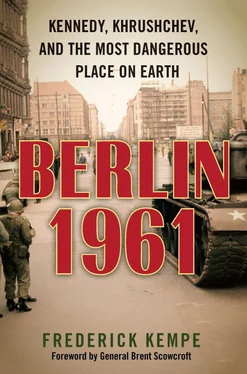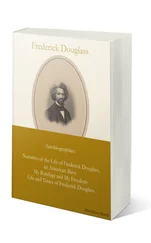Khrushchev’s 1956 repudiation of Stalin and of his personality cult had strained the relationship further. “They understood the implications for themselves,” Khrushchev said of the Chinese. “Stalin was exposed and condemned at the Congress for having had hundreds of thousands of people shot and for his abuse of power. Mao Tse-tung was following in Stalin’s footsteps.”
The downward spiral in relations accelerated in June 1959 when Khrushchev reneged on a pledge to give the Chinese a sample atomic bomb while at the same time moving to improve relations with the Americans. Mao told fellow party leaders that Khrushchev was abandoning communism to make pacts with the devil.
Khrushchev further strained ties when he returned to China shortly after his 1959 U.S. trip to celebrate the tenth anniversary of the People’s Republic. Instead of simply praising Mao’s revolution, Khrushchev used a state banquet as well to congratulate himself for reducing world tensions through the “Camp David spirit” that he had created with Eisenhower.
On the same trip, Mao blew a cloud of cigarette smoke in Khrushchev’s face while he talked—though he knew the Soviet leader hated nothing more—and mocked him for what he called disorganized rambling. Mao’s efforts to humiliate Khrushchev reached their low point at an outdoor pool where he took him for further discussions. The champion swimmer Mao dived in the deep end and performed laps gracefully while Khrushchev floundered in the shallows with the help of a life ring tossed in by Chinese aides. On the drive home from the pool, Mao told his physician that he had so tormented Khrushchev it was like “sticking a needle up his ass.”
Khrushchev knew he had been set up: “The interpreter is translating, and I can’t answer as I should. It was Mao’s way of putting himself in an advantageous position. Well, I got sick of it. All the while I was swimming, I was thinking, ‘The hell with you.’”
The first sign of how much uglier matters would get between Mao and Khrushchev had come five months earlier, on June 20, 1960, in Bucharest, where the Romanians had hosted fifty-one national communist delegations for their 3rd Party Congress. Just two days before the gathering, Khrushchev had announced that he would attend after failing to bridge differences with a Chinese delegation that had visited Moscow en route to the Romanian capital. His participation turned an insignificant, provincial party meeting into the most open warfare yet between leaders of the two most powerful communist states. To prepare the ground, Boris Ponomarev, chief of the International Department of the Soviet Central Committee, had circulated Moscow’s case against Mao’s “misjudgment of the current global situation” in the form of an eighty-one-page “Letter of Information” for Congress delegates. In it, Khrushchev explained his intention to continue his disputed course of peaceful coexistence with the new U.S. president.
With Mao absent from Bucharest, his counterthrust was delivered by Peng Zhen, the head of the Chinese delegation and a legendary communist who had guided resistance to Japanese occupation and ultimately the communist capture of Beijing in 1948. [1] In the 1990s, Peng would come to be considered one of “the Eight Immortals of the Chinese Communist Party.”
Peng stunned delegates with the fierceness of his unprecedented attack on Khrushchev, which he supported by circulating copies of a lengthy correspondence the Soviet leader had sent to Mao that year. The Soviet leader’s letter shocked delegates in two respects: the crude language with which Khrushchev spewed venom at Mao, and the Chinese breach of confidentiality in sharing the private communication with others.
Khrushchev turned as vicious as veteran delegates had ever seen him in a final, closed session. He attacked the absent Mao as “a Buddha who gets his theory out of his nose” and for being “oblivious of any interests other than his own.”
Peng shot back that it was now clear Khrushchev had organized the Bucharest meeting only to attack China. He said the Soviet leader had no foreign policy except to “blow hot then cold toward the imperialist powers.”
Khrushchev was livid. In a furious, impulsive froth, he issued overnight orders that would undo Soviet economic, diplomatic, and intelligence-gathering interests in China that had taken years to establish. “Within the short span of a month,” he decreed, he would withdraw 1,390 Soviet technical advisers, scrapping 257 scientific and technical cooperation projects, and discontinuing work on 343 expert contracts and subcontracts. Dozens of Chinese research and construction projects came to a stop, as did factory and mining projects that had begun trial production.
Despite all that, the Bucharest communiqué had been crafted to carefully hide from the West the truth about the head-on collision of communism’s leaders. That would be harder to conceal at the November follow-on meeting in Moscow, which included many of the same delegates but was far larger and at a higher level.
Khrushchev’s intense lobbying before the meeting and cajoling during the conference kept the Chinese in check. Only a dozen country delegations among the eighty-one sided with China’s objections to Khrushchev’s course of liberalizing communism at home and peaceful coexistence abroad. Still, even that level of opposition to Soviet rule was unprecedented.
With Mao in Beijing, Khrushchev and Chinese General Party Secretary Deng Xiaoping locked horns behind closed doors at the Kremlin’s St. George’s Hall. Khrushchev called Mao a “megalomaniac warmonger.” He said Mao wanted “someone you can piss on…. If you want Stalin that badly, you can have him—cadaver, coffin, and all!”
Deng attacked the Soviet leader’s speech, saying, “Khrushchev had evidently been talking without knowing what he was saying, as he did all too frequently.” It was an unprecedented personal insult to the communist movement’s acknowledged leader on his own turf. Mao’s new ally, the Albanian leader Enver Hoxha, made the most vicious of all the speeches, saying Khrushchev had blackmailed Albania and was trying to starve his country into submission for remaining true to Stalin.
In the end, the Soviets and the Chinese negotiated a ceasefire. The Chinese had been surprised by the support the Soviet leader could still muster and retreated, having seen the futility of splitting the communist movement at such a crucial moment. The Chinese reluctantly accepted Khrushchev’s notion of peaceful coexistence with the West in exchange for the Soviet leader’s agreement to increase support for capitalism’s opponents across the developing world.
The Soviets would resume assistance to China and thus keep construction work going on 66 of the 155 unfinished industrial projects they had begun. However, Mao didn’t get what he most wanted: high-end collaboration on military technology. Mao’s interpreter Yan Mingfu viewed the agreement as only “a temporary armistice. In the long run, events were already out of control.”
With the Chinese temporarily in check, however, Khrushchev moved to protect his East German flank.
THE KREMLIN, MOSCOW
WEDNESDAY, NOVEMBER 30, 1960
Ulbricht sat forward and erect in his chair, listening skeptically as Khrushchev briefed him on his strategy for handling Kennedy and Berlin in 1961. The East German leader had peppered Khrushchev with three letters since October, each increasingly critical of Khrushchev’s failure to counter his country’s growing economic difficulties and refugee bleed with a more determined response.
Having given up hope that Khrushchev would act on Berlin at any point soon, Ulbricht had begun to act unilaterally to tighten his control over Berlin. For the first time, East Germany was requiring that diplomats accredited to West Germany seek permission from East German authorities to enter East Berlin or East Germany—and in one high-profile incident had turned back Walter “Red” Dowling, the U.S. ambassador to West Germany. The East German moves directly contradicted Soviet efforts to expand diplomatic and economic contacts with West Berlin and West Germany. So on October 24, Khrushchev had angrily ordered Ulbricht to reverse the new border regime. Ulbricht had reluctantly complied, but tensions between the two men continued to grow.
Читать дальше











